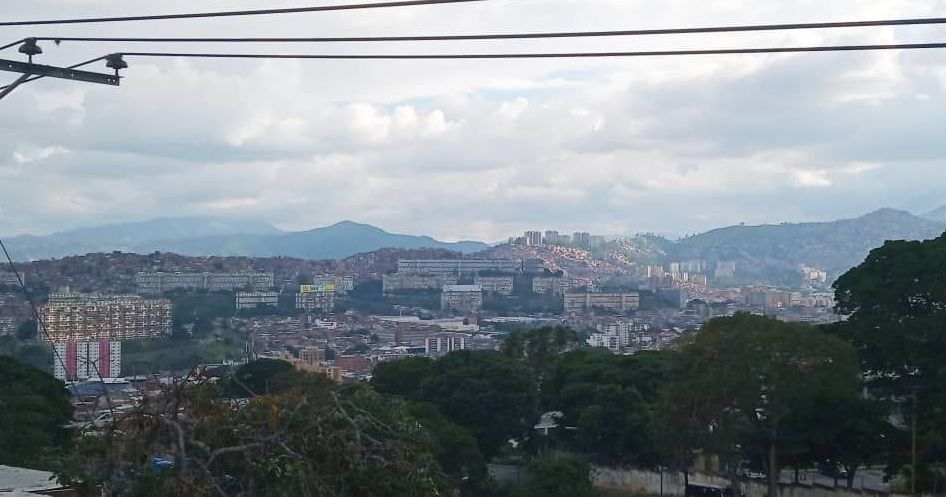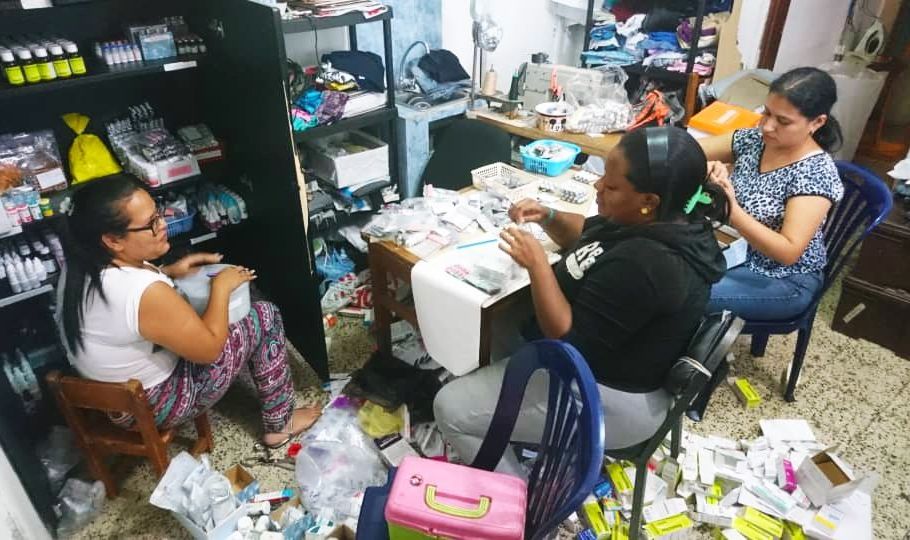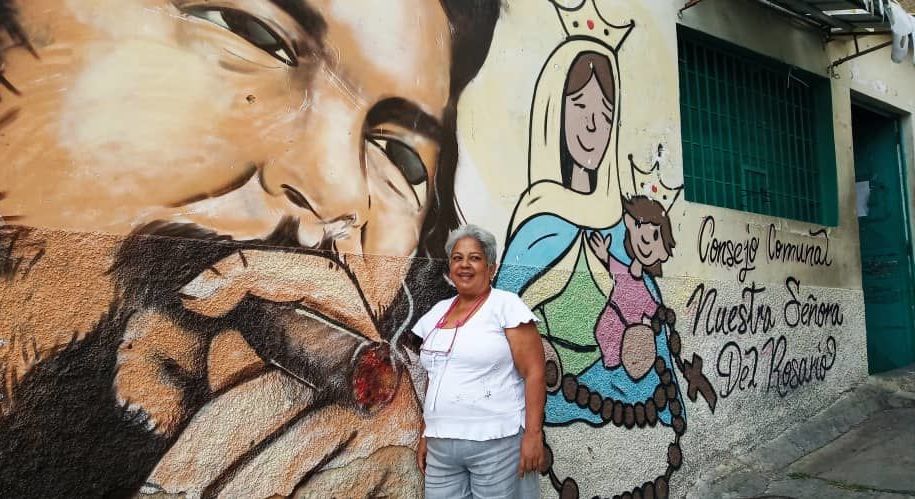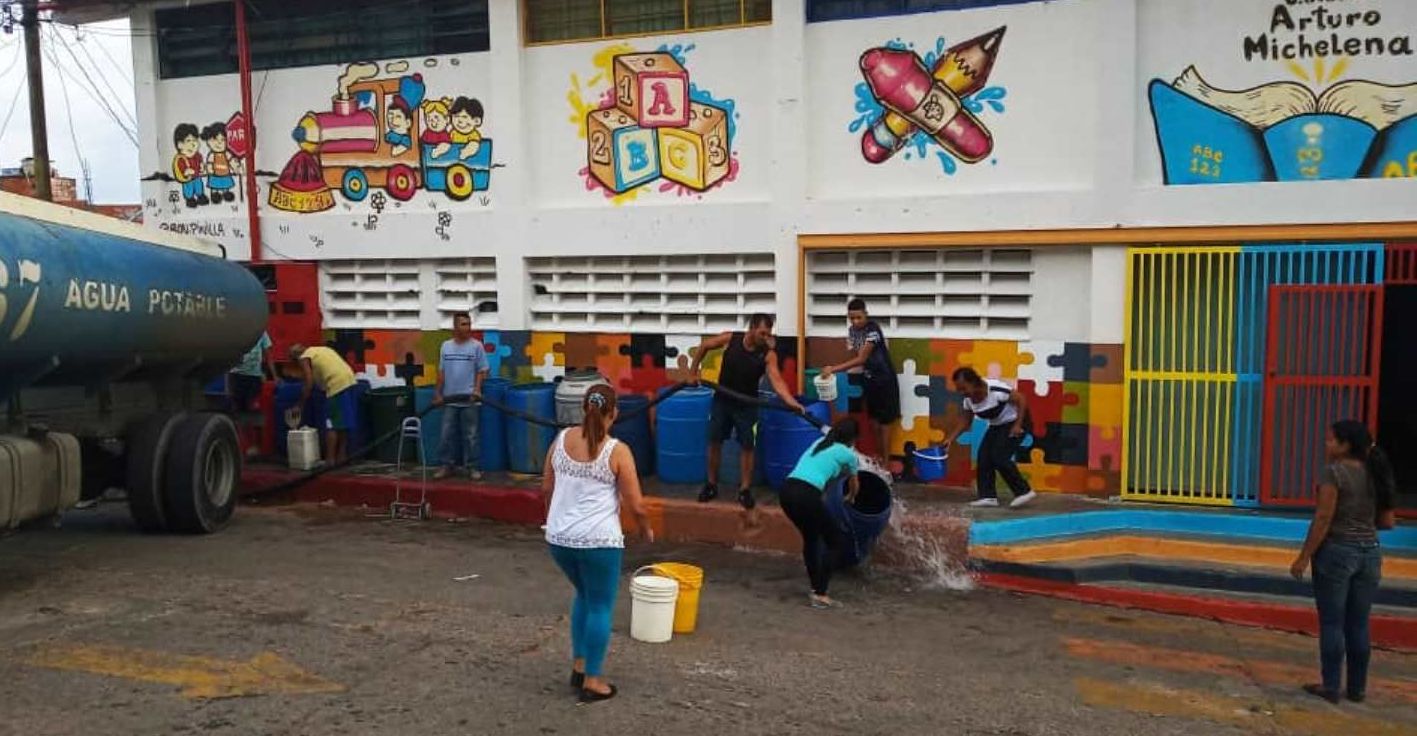How Neighborhoods React to the Economic Blockade in Venezuela


Orinoco Tribune – News and opinion pieces about Venezuela and beyond
From Venezuela and made by Venezuelan Chavistas

By Marco Teruggi
The blockade on the Venezuelan economy is not abstract: it hits on a daily basis in the macroeconomics and in the popular neighborhoods. There, in the hills where the most humble classes live, there is debate about finding ways to deal with it.
Things will get harder. The economic blows of the US government against Venezuela announce that more problems will come, adding to an already difficult situation, particularly in humble neighborhoods. “Hey, how long, how people endure, is worthy of admiration for strength, resistance,” says Rosiris Zapateiro, known as ‘La Portu’ in her neighborhood of Altos de Lídice, Caracas.

© SPUTNIK / MARCO TERUGGI Caracas neighborhood Altos de Lídice, in Venezuela
Endure. Like the poem by Juan Gelman: “learn to resist, or leave or stay, to resist.” There have already been several years of shortages followed by hyperinflation, crossed by the deterioration of services, violent assaults from the right. The signing of the embargo by Donald Trump will bring greater difficulties. What to do? It is the question asked by the community leaders of the neighborhood.
“In the last session of the parliament of the commune there was a discussion about this situation because many things are going to get worse,” explains Jesús García, Altos de Lídice community member. “If the problems increase, we must change methodologies, criteria, work in greater unity.”
Leaders have a responsibility towards communities: “people expect one, we are the face of this,” says Rosiris. There are many fronts simultaneously: prices, food, water, transportation, health, infrastructure.
You cannot wait until “the State tries to solve all the problems in the middle of the difficulties, it can do less blockaded, so we have to look for alternatives to get ahead”, he adds.
Day to day
The commune encompasses every front it can. It has built a social property services company to take care of public spaces, lighting, is in the process of operating a bus to ensure mobility to the highest part of the neighborhood, organizes youth activities such as sports championships and workshops to train communal communicators; “We are dynamically in almost all areas,” explains Jesus.
RELATED CONTENT: A Brief Manual for Foreigners on Why Venezuela Has Not Fallen
Within what to do everyday they have prioritized strategic axes. Food is one of them: “there must be no shortage now or tomorrow,” says Jesus, and priority attention should be given to families with many children, single mothers, elderly people, those with difficulty leaving their homes.

© SPUTNIK / MARCO TERUGGI Community members of the Caracas neighborhood Altos de Lídice, in Venezuela
For that they work on three fronts: one of them is the communal markets that they organize regularly in different parts of the commune, another is the food house that works in coordination with the State programs, and another the work with the Local Supply Committees and Production (Clap), and finally, a communal warehouse that is in the process of opening: there they will sell food brought directly from the El Maizal Commune from Lara state.
The opening of the warehouse is scheduled for late August. They will sell pork, meat, corn, cheese. At the moment they discuss the costs, sale prices, surpluses, who will be in charge, how the comptrollership will be held, the sales circuits to distribute in the communal territory.
“I never wanted to make a profit with anything,” says Ingrid Lucero, who opened a space in his house for the warehouse to work there. She was in charge of the Food Mission in her community since the beginning, when there was an abundance. The situation is now difficult, she lives with her pension, and her husband with a minimum salary.
Ingrid has a certainty: “I am still more Chavista than ever, I committed to an ideal and I know that the difficulties, the good, the bad, will always happen, and more when you have the US power against us.” She puts herself in front, to build the necessary answers.
Another central axis of the commune is health. They have created a communal system that includes the repair of offices of the Barrio Adentro Mission, personalized attention to those who cannot leave their home, and the recent opening of a communal pharmacy. The medicines are the product of solidarity donations gathered in Chile, administered by the community system of Altos de Lídice.
The pharmacy offers at the moment about 250 treatments per month, has its comptroller and distribution system. “If you saw the joy when we take the medicine to people, it is our thanks,” says Rosiris.
RELATED CONTENT: Rebuilding the Hegemony of Chavismo: A Conversation with Gerardo Rojas (Part I)
The Red line
The neighborhood never stops. One of the problems is the arrival of water. In the upper part of Altos de Lídice they receive one or two tanks per week, the neighbors go with large tanks to fill them and then transfer them in smaller containers to their homes.

© SPUTNIK / MARCO TERUGGI Commune of the Caracas neighborhood Altos de Lídice, in Venezuela
Jesus and Rosiris agree on one point: “the border is the Clap boxes, that is the thin red line”. We hardly hold out without the CLAP, they say. A box with 19 food products costs the same as half a kilo of cornmeal in the street. When the boxes are delayed the tension grows, messages to know when they will arrive.
That is why US attacks seek to break import circuits with attacks on companies, ships, payment systems. The CLAP are for the neighborhood what oil is for the national economy: vital.

© SPUTNIK / MARCO TERUGGI Community members of the Caracas neighborhood Altos de Lídice, in Venezuela
Just as vital is the popular organization in the community. “If not this would be total chaos, people feel they have an entity here in the neighborhood, in the CLAP, the commune, to go to express their problems, where to go, who will listen to them, who is not going to solve them immediately, but will do the diligence,” explains Ingrid.
“Without the leadership, the organization, and in the midst of a situation like this, we would each be saved by our own,” adds Jesus.
It is a daily, permanent battle, where needs increase, the pressure to build responses as well increase. “The commune is a practical instrument for the community to organize and solve problems at any juncture, especially and even more in one like this.” The commune must resolve [problems] with its own strength while articulating with the Government, the institutions, the political leadership.
Facing it
Leaders must respond to their communities. They ask, in turn, for answers from the Government, “coherence,” as Jesus says. “The government wants to make the population understand that they are in the middle of a war, and that the problems that are experienced in the communities, in the country, are not a cause of inefficiency, or bureaucracy or ailment of the State, but that they are part of the war blockade, but when there are actions that contradict logic people think otherwise,” he explains.
The role of leaders is central in times of crisis. “What the people demand is that their leaders are on top of the political moment, and not based on speeches and great acts, and that the espadrilles are really put on because the people have put them on for a while and have been dancing joropo for a long time, the toughest.”
The process of attrition and assault conducted from the US can be faced. It has been demonstrated by the reaction in the slums during these years, the ability to resist, to find ways to solve an acute condition in a country that has lost more than half of its GDP in six years. More difficulties will come, the blockade seeks that the suffocation is so great that the country, the neighborhoods, the subjectivities, break down.
“The blockade also affects the emotional, but we are one of those who believe that pa’lante is pa’llá, and that lowering our arms is not only betraying Chávez but betraying ourselves, those of us who believe and stay in this country, we understand that there are ways, ways and alternatives to get ahead,” says Jesus.
Translated by JRE/EF
You must be logged in to post a comment.